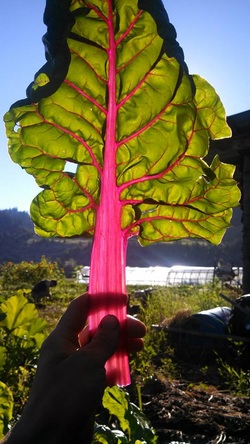GMO-Free Commitment

We agree 100% with the GMO-Free statement of the Certified Organic Association of BC (COABC). Since we are transitionally certified organic through the North Okanagan Organic Association (NOOA 04-208), our seeds are certified organic or GMO-free if certified organic seed is unavailable. When possible, we use seed that has been saved by ourselves or our friends.
In particular, we stand behind the COABC's demand for labelling, as everyone has the right to know the source of their food and whether the base genetic makeup has been altered in some way. Since mandatory labelling is not in place, finding certified organic food (and knowing your farmer) is the best way to ensure that the item is GMO-free.
As stewards of the land, living from a philosophy of working with the land so that biodiversity and a healthy ecosystem thrive for years to come, "GM contamination is utterly unacceptable as it puts our entire food system at risk."
We also reject Agriculture Canada's proposal for low level presence (sometimes termed "substantial equivalence") and advocate for the removal of GM products entirely.
Substantial equivalence is thoroughly discussed in GMO Myths and Truths: An Evidence-Based Examination of the Claims Made for the Safety and Efficacy of Genetically Modified Crops, Version 1.3 b, authored by Michael Antoniou, Claire Robinson, and John Fagan (2012).
“The concept of substantial equivalence has never been properly defined; the degree of difference between a natural food and its GM alternative before its ‘substance’ ceases to be acceptably ‘equivalent’ is not defined anywhere, nor has an exact definition been agreed by legislators. It is exactly this vagueness that makes the concept useful to industry but unacceptable to the consumer...
“Substantial equivalence is a pseudo-scientific concept because it is a commercial and political judgment masquerading as if it were scientific. It is, moreover, inherently anti-scientific because it was created primarily to provide an excuse for not requiring biochemical or toxicological tests." – Millstone E, Brunner E, Mayer S. Beyond “substantial equivalence”. Nature. 1999; 401(6753): 525–526.16
**************************************************
Being GMO-free also helps to protect our food sovereignty, which is an approach to food security that includes social justice and sustainability in the food system.
Pillars of Food Sovereignty
1. Focuses on food for people
2. Values food providers
3. Localizes the food system
4. Puts control locally
5. Builds knowledge and skills
6. Works with nature
7. Food is sacred
In particular, we stand behind the COABC's demand for labelling, as everyone has the right to know the source of their food and whether the base genetic makeup has been altered in some way. Since mandatory labelling is not in place, finding certified organic food (and knowing your farmer) is the best way to ensure that the item is GMO-free.
As stewards of the land, living from a philosophy of working with the land so that biodiversity and a healthy ecosystem thrive for years to come, "GM contamination is utterly unacceptable as it puts our entire food system at risk."
We also reject Agriculture Canada's proposal for low level presence (sometimes termed "substantial equivalence") and advocate for the removal of GM products entirely.
Substantial equivalence is thoroughly discussed in GMO Myths and Truths: An Evidence-Based Examination of the Claims Made for the Safety and Efficacy of Genetically Modified Crops, Version 1.3 b, authored by Michael Antoniou, Claire Robinson, and John Fagan (2012).
“The concept of substantial equivalence has never been properly defined; the degree of difference between a natural food and its GM alternative before its ‘substance’ ceases to be acceptably ‘equivalent’ is not defined anywhere, nor has an exact definition been agreed by legislators. It is exactly this vagueness that makes the concept useful to industry but unacceptable to the consumer...
“Substantial equivalence is a pseudo-scientific concept because it is a commercial and political judgment masquerading as if it were scientific. It is, moreover, inherently anti-scientific because it was created primarily to provide an excuse for not requiring biochemical or toxicological tests." – Millstone E, Brunner E, Mayer S. Beyond “substantial equivalence”. Nature. 1999; 401(6753): 525–526.16
**************************************************
Being GMO-free also helps to protect our food sovereignty, which is an approach to food security that includes social justice and sustainability in the food system.
Pillars of Food Sovereignty
1. Focuses on food for people
2. Values food providers
3. Localizes the food system
4. Puts control locally
5. Builds knowledge and skills
6. Works with nature
7. Food is sacred
